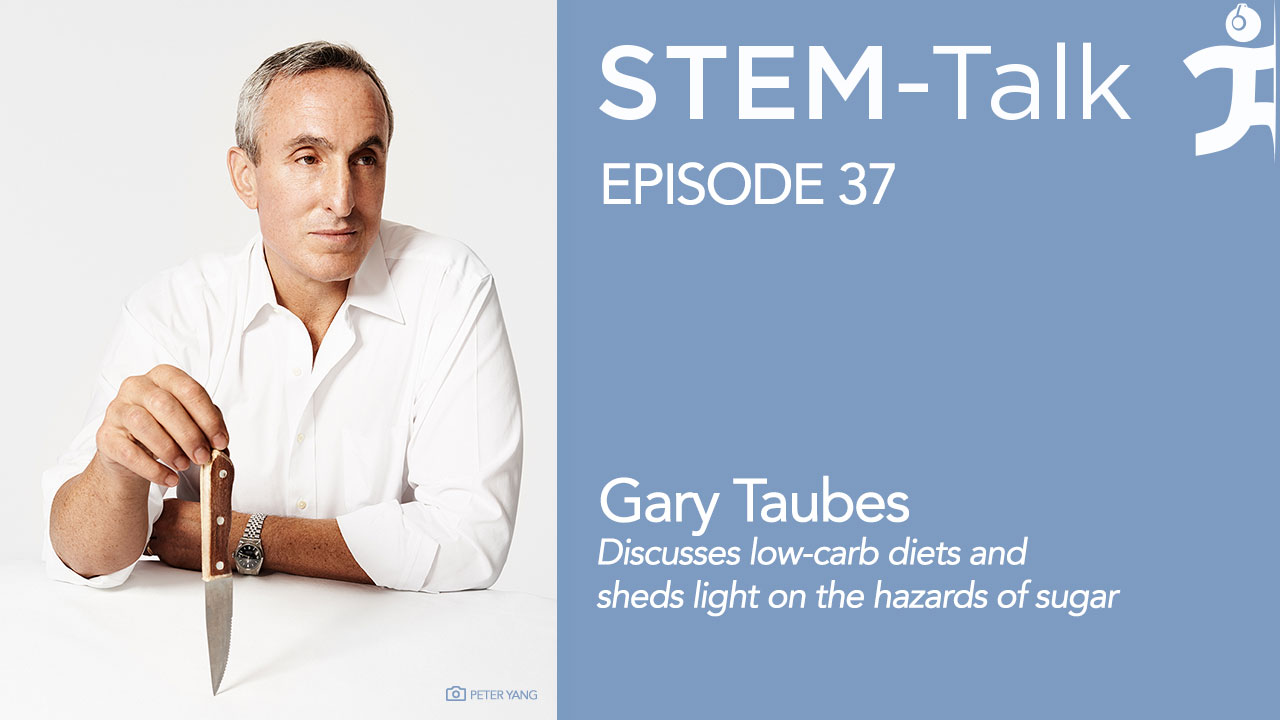STEM-Talk
Episode 37: Gary Taubes discusses low-carb diets and sheds light on the hazards of sugar
// May 9, 2017

The front pages of Gary Taubes’ new book on sugar feature a blurb excerpted from the magazine Scientific American:
“Taubes is a science journalist’s science journalist who researches topics to the point of obsession – actually, well beyond that point – and never dumbs things down for readers.”
Gary’s most recent obsession is documented in “The Case Against Sugar,” a book that argues that increased consumption of sugar over the past 30 to 40 years has led to a diabetes epidemic not only in the United States, but an epidemic that’s now spreading around the world.
Episode 37 of STEM-Talk features a more than two-hour conversation with Gary about his latest research as well as a look back at other nutrition and science topics that have dominated Gary’s journalistic investigations since the 1980s.
Gary first burst onto the national scene in 2002 with an article in the New York Times Magazine titled, “What If’s It’s All Been a Big Fat Lie?” Gary made the point that Robert Atkins and his high-fat, low-carb diet had a better history and scientific record of helping people lose weight than the low-fat diet that was and remains the centerpiece of the nation’s health policy and food pyramid.
The article had an immediate impact. As Michael Pollan pointed out in the introduction of “The Omnivore’s Dilemma,” in the fall of 2002 bread “abruptly disappeared overnight from the American dinner table.” Virtually overnight, wrote Pollan, Americans changed the way they eat.
Gary did not set out to become a science journalist. He graduated from Harvard College in 1977 with an S.B. degree in applied physics and went on to earn an M.S. degree in aeronautical engineering from Stanford University. But while at Stanford, he realized he wasn’t that passionate about becoming an aeronautical engineer and decided to enroll in the Columbia School of Journalism to become an investigative reporter.
In the ‘80s, Gary became fascinated with flawed science and started writing a series of magazine articles about bad science. That eventually led to a pair of books: “Nobel Dreams” in 1987 and “Bad Science: The Short Life and Weird Times of Cold Fusion” in 1993. After “Bad Science,” Gary turned to nutrition reporting and that resulted in the 2002 article in the New York Times Magazine.
He followed up on his research for the article with two books: “Good Calories, Bad Calories” in 2007; and “Why We Get Fat” in 2010. Both books detailed how refined carbohydrates are largely responsible for America’s rising obesity rate and a primary cause of heart disease, diabetes, cancer, and other chronic diseases of the Western diet. His new book, “The Case Against Sugar,” takes this argument a step further and shows how the explosion of sugar consumption and sugar-rich products in the United States has led to a global diabetes epidemic.
Dan Barber, author of “The Third Plate,” wrote in a New York Times review of Gary’s book, “Comparing the dangers of inhaling cigarettes with chowing down on candy bars may sound like a false equivalence, but Gary Taubes’s “The Case Against Sugar” will persuade you otherwise. Here is a book on sugar that sugarcoats nothing. The stuff kills.”
Below are links to Gary’s books:
“The Case Against Sugar” http://amzn.to/2ps8Qbl
“Good Calories, Bad Calories” http://amzn.to/2qTwJJ6
“Why We Get Fat” http://amzn.to/2qKuv2u
“Bad Science” http://amzn.to/2qTjyrI
“Nobel Dreams” http://amzn.to/2pXpRgK
Show notes:
4:41: Ken and Dawn welcome Gary to the show and ask him to talk about how a Harvard physics major ended up going to journalism school to become an investigative reporter.
12:53: Dawn asks Gary to tell the story behind his 2002 article in The New York Times Magazine, “What If It’s All Been a Big Fat Lie?”
21:13: Gary shares how his work for “What If It’s All Been a Big Fat Lie?” led to additional research and the book, “Good Calories, Bad Calories.”
31:00: Gary explains how his study of physics gave him a passion for understanding the history of theories, and how that passion has helped him over the years as an investigative reporter.
43:44: Dawn asks Gary to share lessons he learned from the Nutrition Science Initiative (NUSI).
50:06: Ken refers to reports about Kevin Hall, a researcher at NIH, who essentially claims he’s disproven the carbohydrate-insulin hypotheses of obesity, and asks Gary for his thoughts.
1:02:40: Dawn asks Gary if he thinks there are specific populations where it would seem less appropriate to be on a low-carb diet?
1:06:44: Ken asks if elevated LDL-P should be a concern for people on low-carb diets since it’s a concern for people on normal diets.
1:13:17: Gary talks about the history of sugar in America.
1:18:08: Ken asks Gary to provide the background on how diabetes is now becoming a worldwide pandemic.
1:31:31: Gary elaborates on the sugars found in cane sugar and high fructose corn syrup.
1:34:43: Dawn asks Gary, “If you could remove sugar from the modern environment, but keep everything else the same, do you think we would have an obesity epidemic?”
1:37:21: Gary talks about what brain scans reveal about the addictive effects of sugar.
1:41:53: Dawn asks Gary to share the background on a 2015 report in The New York Times that Coca-Cola initially subsidized the Global Energy Balance Network.
1:46:55: Gary talks about the role of the microbiome.
1:51:31: Ken asks Gary to share his thoughts about the possible effects of artificial sweetners.
1:54:33: Dawn asks Gary how his personal dietary approach has changed over the years.
1:59:01: Dawn and Ken thank Gary and sign off.






